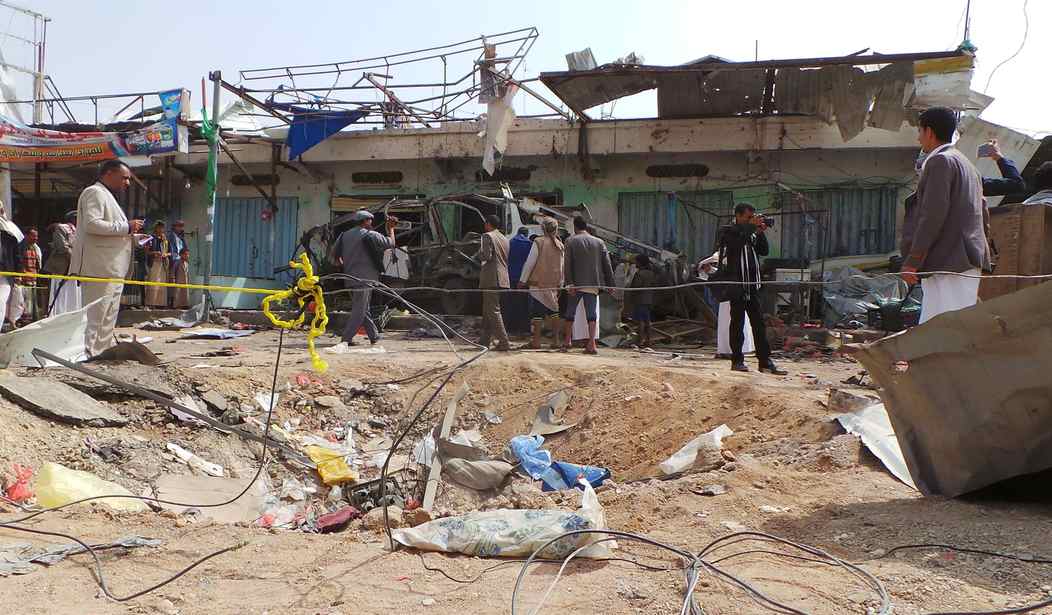Critical facts on the ground don't support the cynical assessment that Yemen's chaotic war pits everyone against one another in a confused melee of carnage and starvation.
Stipulate the key combatant coalitions, the Saudi Arabia-led pro-Yemen government coalition and the Iran-backed Houthi rebel confederation -- both have political weaknesses. Despite their flaws, they manage to form two distinct sides with enough weapons and moral resilience to spill blood over issues and interests that affect Saudi Arabia and Iran, threaten the Middle East and torture Yemen.
With that larger circumstance acknowledged, local alliances can rapidly shift for intimate or transient reasons nation state spies fail to divine in Yemen. Criminals (particularly smugglers) frequently serve multiple belligerents since the crooks' real master is money. In anarchic circumstances like those afflicting Yemen, diplomats, spies and reporters may understandably confuse criminal violence with guerrilla combat.
Now for the significant qualification: In war, enemies can and do make opportunistic arrangements. World War One's tactical truces between British and German soldiers to retrieve the wounded are altruistic examples.
However, malign deals are also struck. That is one reason the Associated Press' sensational report that the Saudi-led anti-Houthi coalition had paid "some" al-Qaida in the Arabian Peninsula (AQAP) commanders "to leave key cities and towns while letting others retreat with weapons, equipment, and wads of looted cash" got media and political traction.
Recommended
The Saudi coalition quickly disputed the report and denied any deals with AQAP terrorists. So did the U.S. Department of Defense. The Pentagon said that since January, 2017, it had hit AQAP in "ungoverned space" with over 140 attacks. Earlier this month StrategyPage.com reported that the U.S. has conducted over 30 UAV attacks in Yemen in 2018.
Fighting al-Qaida in Yemen is old news that remains relevant. In November, 2002, a CIA-operated Predator Unmanned Aerial Vehicle in Yemen's Marib province killed six al-Qaida terrorists with a Hellfire missile. One of the terrorists was the brains behind the attack on the USS Cole in the Yemeni port of Aden in October, 2000. The Yemen strike was the first time an American drone attacked Islamist terrorists outside of Afghanistan.
Yet America's 2018 war on al-Qaida in Yemen is a background conflict. So is al-Qaida's war with the Islamic State, the notorious Sunni Islamist terrorist organization. You missed that news? In mid-July, local sources in Yemen's Al Baida province reported firefights between al-Qaida and Islamic State fighters. Subsequent government reports provided an unconfirmed death toll: 18 Islamic State corpses, 11 Al Qaeda stiffs. Accurate? Who knows? But opportunistic arrangements between thugs usually end in mutual bloodshed.
Al-Qaida and Iran have opportunistic relationships that other media organizations have covered. Recently, The Weekly Standard reminded the world that Shia Muslim Iran's Lebanese Hezbollah Shia proxies provided al-Qaida's Sunni extremist terrorists with explosives training in preparation for al-Qaida's attacks on the U.S. embassies in Tanzania and Kenya. Those attacks occurred two decades ago -- August 7, 1998.
The American war on Islamist terrorists and the Islamist terrorists' civil war amongst themselves flicker beneath the larger clash between the Saudi coalition and Iran's Houthi rebels.
The United Arab Emirates, a Sunni Muslim Arab nation and Saudi Arabia's primary ally in Yemen, is publicly incensed at the "deals with al-Qaida" accusation. A senior Emirati officer said the terror group is a regional and global threat and the UAE is "determined" to destroy AQAP.
If there was an opportunistic arrangement between coalition forces and local AQAP fighters, it sounds like the deal was very local, and extremely short-lived.
























Join the conversation as a VIP Member